Cameron McEvoy secures elusive Olympic gold in the 50 metres freestyle in Paris
At his fourth Olympic Games, Cameron McEvoy has achieved the gold medal he craved, he dreamt about and the first gold medal for an Australian male swimmer at the Paris Olympics.
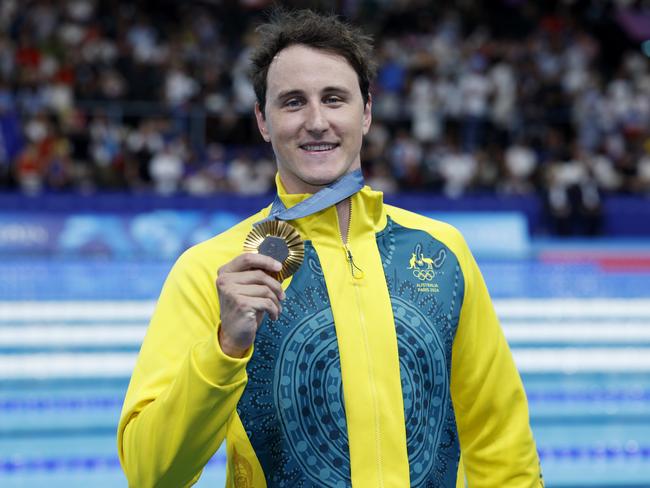
Swimming
Don't miss out on the headlines from Swimming. Followed categories will be added to My News.
Cameron McEvoy had a dream on May 18, 2022. On August 2, 2024 it became a reality.
The dream was simply the pursuit of closure. To convince himself he had given everything to his swimming career, exhausted every option and along the way maybe tried a new way of sprint training that could change the world of sprint swimming.
In the end he won Australia’s first ever men’s 50m freestyle Olympic gold medal - and redefined the sport.
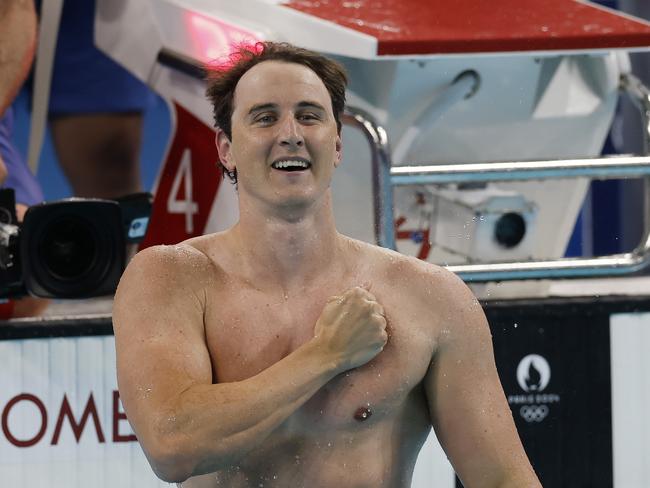
“It’s ultimately incredible,” McEvoy said.
“It’s hard to explain the two year process and it took me even longer like even from the start of my swimming career, but particularly the last few years that route I took to get here.
“It’s very hard to describe that and for me, that definitely surpasses just like the 21 seconds tonight getting the gold medal. That’s just kind of the tip of the iceberg.
“The act of creation effectively over the last few years to start from, I guess, not really having much of an idea and then just developing something and seeing where it can go and myself being as the guinea pig going through the motions and seeing where it will take me. That’s something that I think I’ll find it very hard to replicate in my life. And that’s going to be something that I’m going to be most proud of forever.”
McEvoy emerged victorious from a frenetic one-lap dash to win in 21.25 seconds from Benjamin Proud in 21.30 and France’s Florent Manadou in 21.56s.
He was the fastest off the blocks - a reaction time of 0.56s giving him at least 0.04s advantage over the field.
Then in the closing 15m he was able to maintain his top speed as the others decelerated.
He’s logged his entire training journey on Instagram, but that closing speed secret he kept quiet until three weeks before the Games knowing his rivals couldn’t copy it to achieve his backend speed with such a short timeframe.
The victory is sweet redemption for the 30-year-old who went to the Rio Olympics as the favourite in the 100m freestyle, but faded to seventh as teen rookie Kyle Chalmers captured the crown.
McEvoy almost walked away from the sport after the Tokyo Olympics, but instead re-invented himself and reshaped his body to attack the 50m sprint and has now added an Olympic gold medal to the world title he won in 2023.
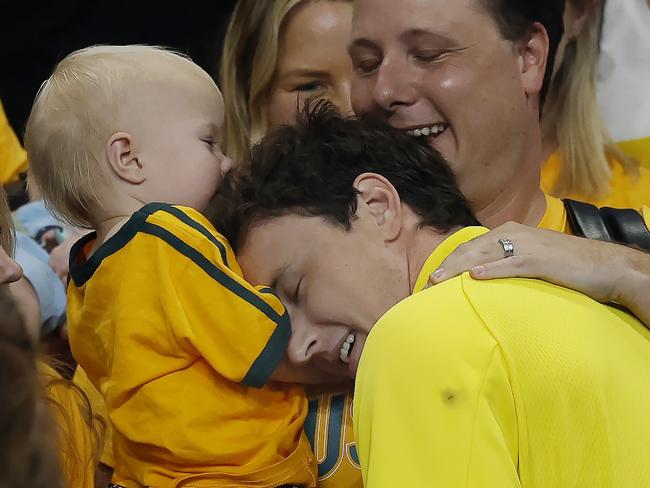
He revealed it was a visit to Paris in May 2022 for a wedding that cemented his desire to pursue the Paris Olympics.
“It was on that day where the photo was taken where I was like, I’d love to be here, I’d love to give it a crack. I don’t know how it’s gonna look but that was the day where I went all in,” McEvoy said.
“I started off with the perspective that it would give me closure. I always knew that was potentially another way to do things for sprint freestyle.
“I’ll do it, if it didn’t work then the closure is right there. That’s just where I was in my career. That’s the potential I could live up to.
“If it worked, okay, see how far I can get and then I can get closure in terms of that as well.
“So it was a win-win situation for me.
“There were obviously training sessions where you’re second guessing and you find out you’re in the pits and things aren’t feeling too great.
“The amount of times that that happened, it was tenfold in our times where I was like right this is special. This is really enjoyable. Right down to like my genome, like right down in my body, it just felt incredible and just like the journey of a lifetime.”
RADICAL APPROACH THAT LED TO GOLD
When Cameron McEvoy touched the wall first in the 50m freestyle Olympic final it did nore than just settle his own personal demons.
It could actually change the way swimmers train — forever.
He and a team of specialists have been quietly working away for years at a new training regime that is more about strength than swimming long, lonely laps in the pool.
It was just an experiment. And there are plenty who were sceptical it would work.
But the popular swimmer proved at the Paris Olympics that he was on to something.
Eight years after he went into the Rio Olympics as hot favourite for the 100m freestyle and walked away empty handed, he finally had his gold medal.
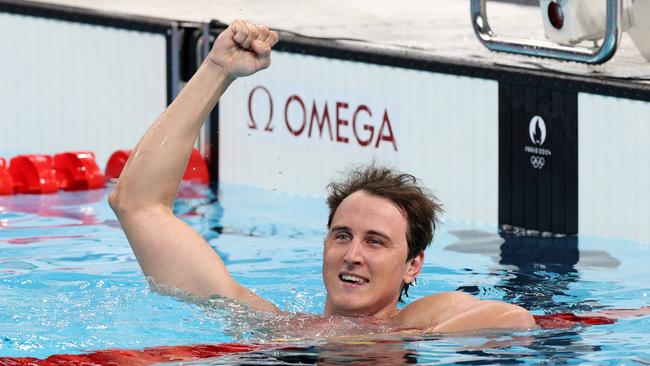
It was in the 50m granted, but it is a gold medal win at a time in his career that most people would assume he would call it quits.
In fact, the word among the swim team is that he may even go on to Los Angeles in 2028 because he feels strong, and most importantly, fast.
Looking more buff than ever, not only is McEvoy bigger than he’s been before after packing on an extra 10kg of muscle, but he’s also planning to stick around a lot longer than he originally planned.
A physicist and mathematician as well as a swimmer, McEvoy is experimenting with a new radical approach to training that he believes will prevent burnout and produce faster times.
“That would be a nice little form of success to have but that’s definitely secondary to the curiosity in the approach I’m taking,” he said before Paris.
“I’m trying to push the boundaries of sprint freestyle … and potentially do this approach right into my late 30s.
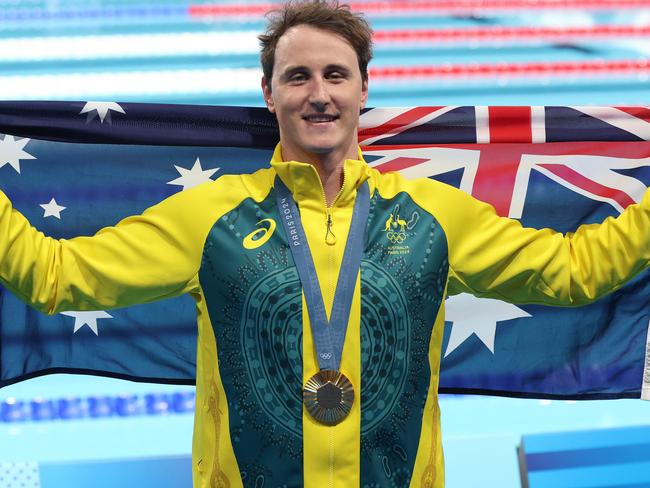
“I’ll be 38 at Brisbane 2032, that would be six Olympics … so the motivation is just to lay down the framework right now, see how it goes and if it looks good, then just carry it forward.”
Already Australia’s fastest-ever freestyle sprinter and a three-time Olympian, McEvoy is embracing the notion that less is best after questioning the conventional approach to training.
Despite competing in the shortest races – 50m sprints that last less than 22 seconds and 100m races that are over in under 48 seconds – McEvoy has been swimming around 50km a week for the past two decades.
The long-held belief is that the key to swimming faster is to spend as much time in the water as possible, but McEvoy is convinced it’s a flawed concept. He found out by accident when he returned to the pool after taking an extended break during the pandemic.
Instead of being slower in the water, McEvoy found he was actually faster the more time he spent on dry land.
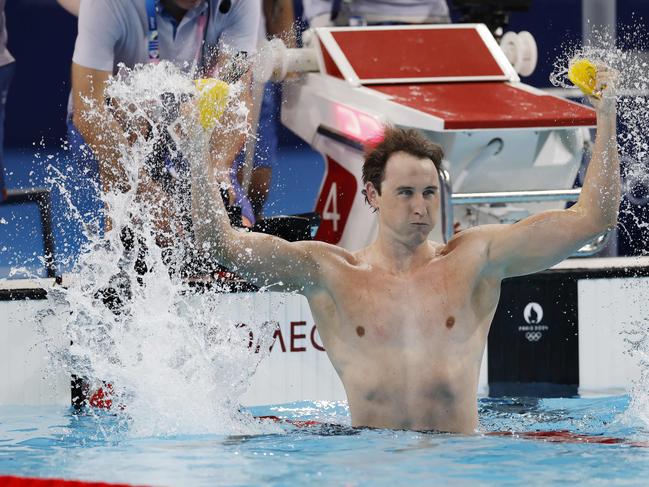
So instead of churning through the laps, he’s been spending more time in the gym, bulking up by doing callisthenics and rockclimbing.
Better late than never, the realisation he could do things differently has given McEvoy a fresh attitude to swimming after he was worn out by the old approach.
“It was also frustrating because I had put in so much time and effort over the last several years working my ass off,” he says.
“Thinking back, there were a lot of counter-productive training efforts.
“But in saying that, if I never went through that, then potentially I never would have been pushed to be in the position I am in now.”
McEvoy’s new approach started paying off in this swim season.
He won the 50m freestyle title at the Australian National Championships in April then twice went under the 22-second barrier at the Sydney Open in May.
And if he needs inspiration that swimmers in their 30s can compete at the highest level, he doesn’t need to look far. In 2016 at the Rio Olympics, American Anthony Ervin won the 50m freestyle gold at the age of 35.






